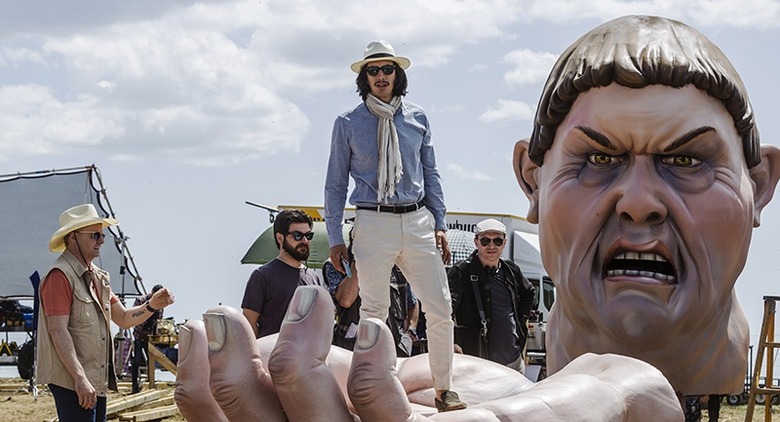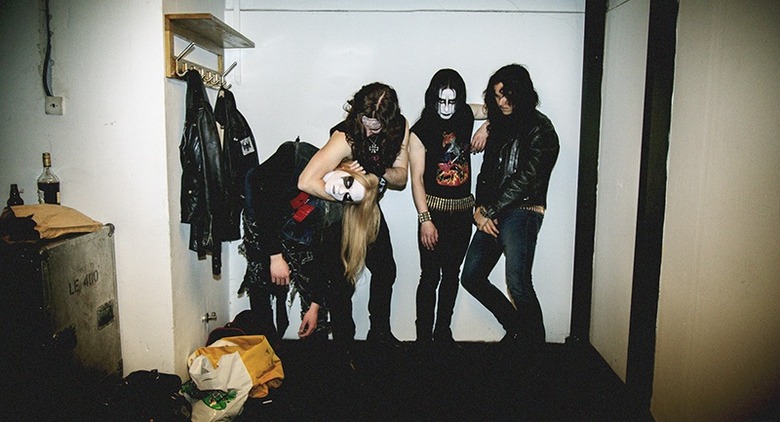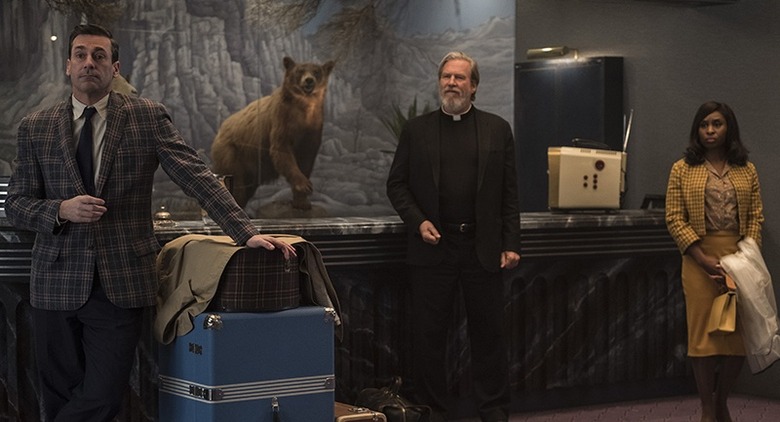Fantastic Fest Day 8: 'Bad Times At The El Royale' Offers Slick Thrills, 'Lords Of Chaos' Blends Metal And True Crime, And 'The Man Who Killed Don Quixote' Finally Arrives
(Welcome to The Fantastic Fest Diaries, where we will be chronicling every single movie we see at the United States' largest genre film festival.)
Welcome to Fantastic Fest, day eight. In this final diary entry: Terry Gilliam's latest film finally arrives, a grisly true crime story set in the world of Norwegian black metal, and the long-awaited new film from the director of The Cabin in the Woods.
The Man Who Killed Don Quixote Feels Like Terry Gilliam's Final Statement
When the dust settles, Terry Gilliam's The Man Who Killed Don Quixote will always run the risk of not being as interesting as the story of its making. 20 years after cameras rolled on a failed first production (chronicled in the documentary Lost in La Mancha), the film has finally arrived after enduring countless false starts and casting changeovers. It's a fascinating tale of development hell and of Gilliam's commitment to getting this passion project made – good or bad, this film was always going to be fascinating simply because it actually managed to exist.
Thankfully, The Man Who Killed Don Quixote is a good movie, one that has evolved to not only be a commentary on itself and its troubled production, but an encapsulation of Gilliam's filmography. The director of Brazil and Time Bandits trots out all of his pet themes and ideas, but there's a sense of melancholy here, a sense of finality. Gilliam is no young man and at 77, he's clearly aware that he may not make another film. This sense of fragility, of time running out, courses through this film. We all die, so what can we do to ensure that our stories do not die with us?
But this isn't a tragic or foreboding experience. Far from it. This is Gilliam at his most playful in decades and his distinct blend of slapstick, silly raunch, biting satire, and electric wit is on full display here. Adam Driver, one of the most game leading men Gilliam has had in years, tears into his role of a filmmaker who, while shooting a Don Quixote-inspired ad campaign in Spain, runs into an actor (a wonderful Jonathan Pryce) who had played Cervantes' famous deluded knight in a student film years prior. And that actor has seemingly gone insane. Now convinced that he is literally Don Quixote, he drags Driver's cynical director on a wild adventure where the thin walls between fantasy and reality blur and eventually break entirely.
Like all Terry Gilliam movies, The Man Who Killed Don Quixote threatens to derail at any given moment and its sheer number of ideas and gags feel like they're too much for a single movie (or even a single scene in some cases). But in Driver and Pryce, Gilliam has found an anchor – two actors who understand the exact tone the filmmaker is shooting for and commit wholeheartedly. It's incredible to see Pryce teaming up with Gilliam again so long after Brazil and the veteran actor chews into his role with gusto. However, the movie asks the most of Driver and he delivers the single best performance in a Gilliam movie since Robin Williams in The Fisher King. Manic and hilarious and ultimately soulful, his journey from jaded corporate hack to dreamer is quintessential Gilliam and Driver finds a way to make it fresh.
Those who are familiar with Gilliam's work will find much of this movie familiar. Dreams are something to be revered and feared in equal measure. Fantasy is how we escape and how we're held prisoner. Stories are the lifeblood of our existence and the powers-that-be will always try to destroy them. But in the film's final moments, Gilliam pauses to take stock of all of this. What does his patented brand of outrage and rebellion, his cinematic middle finger, mean when he croaks? Will someone be around to carry the torch? And Gilliam, one of cinema's most cynical dreamers, imagines yes.
Lords of Chaos is a Messy and Grotesque Tale of Music and Mayhem
As an actual series of true crime events, Lords of Chaos is absolutely riveting and sent me scrambling to the internet to learn more as soon as the credits rolled. As a film, it's a bit messier, but perhaps that's appropriate – this is a movie about murder and chaos in the Norwegian black metal scene, so a clean-cut story simply wouldn't do.
There are stretches of Jonas Åkerlund's gruesome drama that feel too repulsive to be true, but hey, this movie is based on real events and most of the facts check out. Lords of Chaos chronicles the birth of Norwegian black metal and its creator, Euronymous (Rory Culkin), who set out to create the world's most "evil" music. At first, the definition of evil is pretty tame, all things considered: black clothes, long hair, claims of Satan worship. And then, as the genre finds a following, things escalate. Self-mutilation. Suicide. Arson. Murder. Euronymous watches as the "evil" music he created inspires real-life acts of chaos, as fans and musicians alike attempt to one-up each other and prove that they have the darkest heart. And at the fringes, the creator watches and barely participates, wanting to maintain the label but unwilling to actually get his hands dirty.
Lords of Chaos may be the most stomach-churning movie ever made about the pitfalls of geek culture. Because make no mistake: this musicians are geeks. Replace their guitars with comic books and Satan with Batman and it all aligns perfectly. This isn't a movie about music as much as it is a movie about young men being consumed by their hobby to the point where it and nothing else defines them. These guys all exist in a state of arrested development, where the only cure is growing up and realizing that, you know, you probably shouldn't murder people because it builds a stronger brand.
Åkerlund offers some moralizing in the homestretch that can't help but feel tacked-on, but that's a footnote for an otherwise visceral experience. While the characters romanticize violence and destruction, the film does not. This is an ugly, mean experience, one that treats its characters' actions with the appropriate amount of horror and disdain. While it may not come together as cohesively as you'd like, there's no denying its raw and awful power.
Bad Times at the El Royale is the Kind of Movie That Feels Like It Needs a Second Viewing
Perhaps it is unfair to write about Bad Times at the El Royale after only one viewing, taken in on the final day of an eight-day-long film festival. It's a deceptively simple thriller: a group of strangers arrive at a once-grand hotel on the California/Nevada border and a bunch of bad stuff happens as their true intentions are revealed. However, writer/director Drew Goddard has a few tricks up his sleeve and leaps around the timeline, revealing backstories and motivations and truths when convenient to the story, not to the characters. It's very much a movie in the Pulp Fiction mode, a film that eschews traditional narrative in favor of building a satisfying puzzle.
And right now, "satisfying" feels like the right word for this movie. Its reveals are clever and fun. Its characters are twisted and complex. It's suspenseful and well-crafted, complete with handsome production design and handsomer actors. Cynthia Erivo, one of the few small names in an ensemble of stars, stands out with a performance that feels guaranteed to earn her work for the foreseeable future. Yet, for all of its pleasures, Bad Times at the El Royale feels like a trifle, a thriller that is too long and not quite exciting enough considering the amount of talent assembled for it.
Still, the more I sit with it, the more I think I need to see it again. The film's period setting isn't just an aesthetic choice, but one chosen with careful thematic relevance. The grab-bag of crooks and murderers and feds who make up the cast aren't just a line-up of bad people, but archetypes that align to different corners of the American nightmare. Drew Goddard's thriller about dangerous people stuck in a hotel together reveals itself to be an allegory for the disintegration of the American dream, set in an era where the rose-colored glasses fell from so many eyes and shattered.
But does that that intention alone make it a great movie? That I'm not sure. However, I'll say this much: I'm saving my final judgment until a second viewing when it hits theaters.



